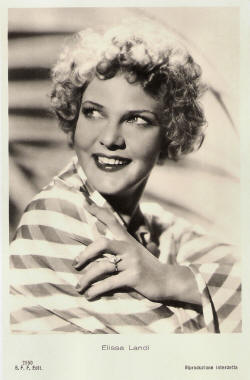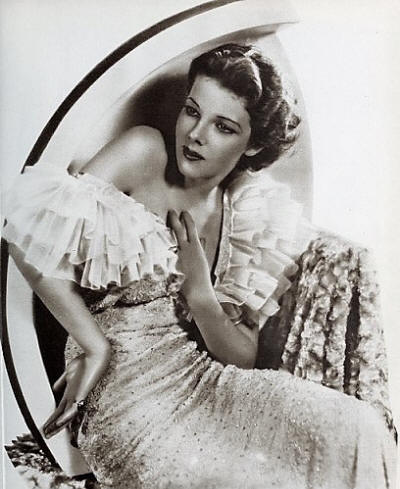

Queer Places:
Oak Hill Cemetery
Newburyport, Essex County, Massachusetts, USA
 Elissa Landi (born Elisabeth Marie Christine Kühnelt; December 6, 1904 – October 21, 1948) was an Italian-born Austrian-American actress and novelist who was popular as a performer in Hollywood films of the 1920s and 1930s.[1] She was noted for her alleged aristocratic bearing.[2]
Rumors of an affair between
Katharine Hepburn and Landi have persisted for decades, supposedly
explaining Laura Barney
Harding’s abrupt departure for the East ahead of Hepburn. At the time,
columnists were hinting strongly that Landi lacked interest in men, another
example of the new aggression being shown by the Hollywood press. But there is
no evidence, aside from a few photographs, of an affair.
Elissa Landi (born Elisabeth Marie Christine Kühnelt; December 6, 1904 – October 21, 1948) was an Italian-born Austrian-American actress and novelist who was popular as a performer in Hollywood films of the 1920s and 1930s.[1] She was noted for her alleged aristocratic bearing.[2]
Rumors of an affair between
Katharine Hepburn and Landi have persisted for decades, supposedly
explaining Laura Barney
Harding’s abrupt departure for the East ahead of Hepburn. At the time,
columnists were hinting strongly that Landi lacked interest in men, another
example of the new aggression being shown by the Hollywood press. But there is
no evidence, aside from a few photographs, of an affair.
The Venice-born actress, of Austrian noble blood, had made her first big splash on the London stage playing a free-loving girl in Lavender Ladies. In Hollywood, she was looked at with even more suspicion than Hepburn. Like Hepburn, she didn’t often play the usual studio publicity game, and as a result was called “cold” and “aloof.” Also like Hepburn, she had a nontraditional marriage; in fact, when she and her husband divorced, it was learned that they’d been allowed to see other people. A blind item dated April 3, 1933, in Landi’s microfilm clipping file at AMPAS is clearly about her (the subject is identified as living with her mother, which Landi did): “Lack of interest in the opposite sex displayed by a femme player who is being groomed for stardom on a major lot has gone so far that it is worrying execs....Execs admit they have hinted to her that she ought to make a date once in a while, but the actress, who is in her 20s, doesn’t take heed.” Landi remarried late in life and had one daughter, who said she’d heard the stories of an affair with Hepburn, but since her mother died when she was very young, had no way of knowing if they were true. The two women likely met through David Manners, who had acted with both of them and was a regular at George Cukor’s.

Landi was born Elisabeth Marie Christine Kühnelt[3] in Venice, Italy, to Austrian military officer Richard Kühnelt and his wife Caroline. She was raised in Austria and educated in England. From 1928 to 1936, she was married to John Cecil Lawrence, and from 1943 to 1948 to Curtis Kinney Thomas (1905-2002). Landi's first ambition was to be an author. She wrote her first novel at the age of twenty, and returned to writing during lulls in her acting career.[4] She debuted on stage in Dandy Dick (1923).[3] She joined the Oxford Repertory Company at an early age, and appeared in many successful British and American stage productions. In 1926 she starred in Dorothy Brandon's Blind Alley in the West End. During the 1920s she appeared in British, French, and German films before traveling to the United States to appear in a Broadway production of A Farewell to Arms (1930). [4] Her other Broadway credits included Empress of Destiny (1938), Apology (1943), and Dark Hammock (1944).[5] She was signed to a contract by Fox Film Corporation (later 20th Century Fox) in 1931. She was paired successfully with some of the major leading men, including David Manners, Charles Farrell, Warner Baxter, and Ronald Colman, in romantic dramas such as Body and Soul (1931, which also featured Humphrey Bogart). In 1931, She starred in the Fox feature, The Yellow Ticket along with a young Laurence Olivier, Lionel Barrymore and Boris Karloff. Raoul Walsh directed. The film was based on Michael Morton's 1914 play and was about a young Jewish girl, who obtains a prostitute's passport during a period Jews were not allowed such freedom so that she can travel around Czarist Russia to visit her sick father. Fox loaned her to Paramount to play Mercia, the female lead in Cecil B. DeMille's 1932 film adaptation of the play The Sign of the Cross. DeMille said he chose her for the role because "There is the depth of the ages in her eyes, today in her body and tomorrow in her spirit."[6] She starred in the box office hit The Count of Monte Cristo (1934) with Robert Donat. Her contract with Fox was abruptly cancelled in 1936 when she refused a particular role. Metro-Goldwyn-Mayer signed her, and after a couple of romantic dramas, she played the cousin of Myrna Loy in the very popular After the Thin Man (1936). She retired from acting in 1943, after making only two more films. Landi became a naturalized U.S. citizen in 1943, and dedicated herself to writing, producing six novels and a series of poems. She had published her first novel as early as age nineteen. She continued writing novels at the height of her movie fame, and for the rest of her short life. She died from cancer in Kingston, New York at age 43, and was buried at Oak Hill Cemetery in Newburyport, Massachusetts. Elissa Landi has a star on the Hollywood Walk of Fame for her contributions to Motion Pictures, at 1611 Vine Street.[7]
My published books: